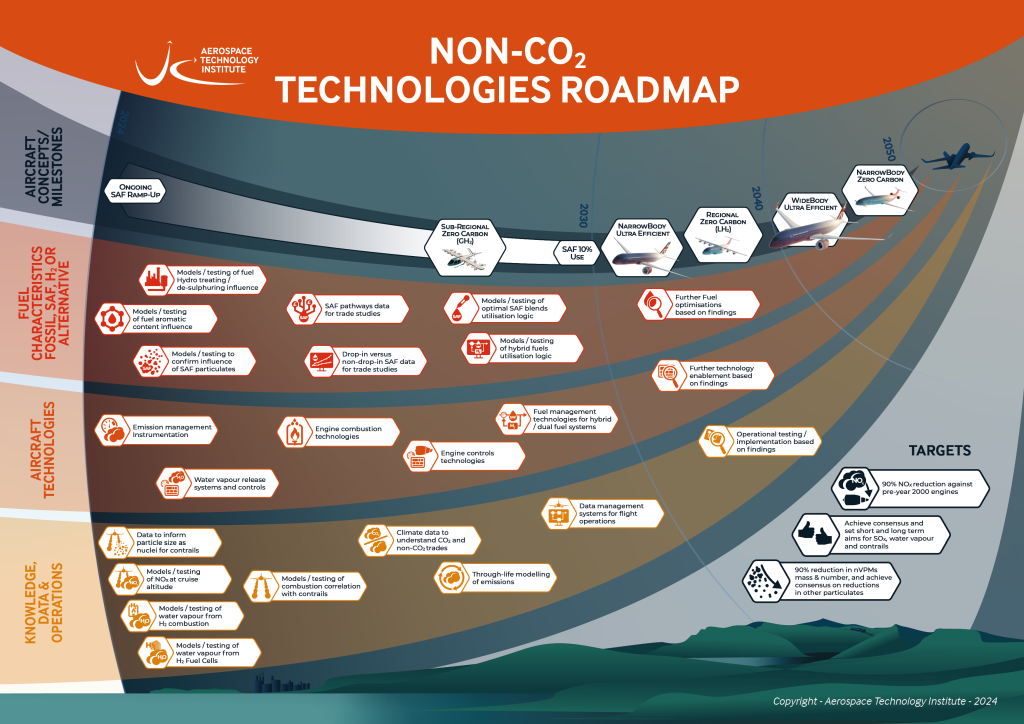UK’s first non-CO2 technologies roadmap published

A first of its kind Non-CO2 Technologies Roadmap published today sets out the aerospace sector’s collective ambition to improve understanding of non-CO2 aircraft emissions and the technology advancements needed to address their climate impact.
The aerospace sector remains steadfast in its aim to reduce carbon emissions in line with the UK government and aviation’s commitment to Net Zero 2050. Now, as understanding of the impacts of non-CO2 emissions grows, a new funding programme will accelerate the research and development of technologies related to reducing these broader aircraft emissions.
Collectively, non-CO2 emissions refers to the direct and indirect effects of combustion found in aircraft exhaust plumes, aside from carbon dioxide. The new roadmap and programme support the government’s Jet Zero Strategy and its commitment to tackle aviation’s non-CO2 emissions, which some research suggests could be greater than the impact of CO2 alone.
The Non-CO2 Technologies Roadmap becomes the fourth pillar of the UK Aerospace Technology Strategy, Destination Zero. This guides key industry and government investment into aircraft technologies with the aim of growing the UK’s share of the global aerospace market, supporting high-skilled jobs and leading the way on more sustainable air travel. Developed with input from almost 100 leading experts from across aerospace and academia, the roadmap will inform the activities to be prioritised for funding under a new ATI Non-CO2 Programme to open in May 2024.

The Non-CO2 Programme forms the industrial arm of the wider Aviation Non-CO2 Programme managed in partnership with Department for Transport (DfT) and the Natural Environment Research Council (NERC). In October 2023, NERC launched a £10m call for academic-led collaborative research proposals, with the winners expected to be announced this Spring.
Improving the fundamental science behind non-CO2 emissions through the NERC led programme will not only underpin the development of more sustainable aerospace technologies, but also drive the adoption of better fuels and new operational measures. This understanding will also shape the development of next generation aerospace technologies at a critical time as the use of new sustainable aviation fuels (SAF) increases and the sector advances novel propulsion systems including hydrogen combustion.
The ATI Non-CO2 Programme will focus predominantly on industrial research, and technology development or enabling-technology projects. Delivered in partnership with DBT and Innovate UK, it will build upon the fundamentals, focusing on developing technologies and scaling up solutions for practical implementation. It will bring academia, government institutions, and industry players together to translate theoretical concepts into viable technologies. This flow from fundamental to industrial research is vital for driving advancements in non-CO2 technologies, reflected in the broad scope of the roadmap.
Non-CO2 emissions from aviation are considered to contribute a climate impact in terms of global warming. However, there remains a high level of uncertainty as to the quantified impacts – usually expressed in terms of radiative forcing (W/m2). The level of uncertainty varies depending on the emission type and in some cases, emissions may also impart a cooling effect.
The climate impact is highly complex and variable depending on many factors including the atmospheric altitude of emissions, weather and regional specifics such as the occurrence of ice super saturated regions (ISSRs). In addition, there are complex interactions and interdependencies between emission types, as well as variation in the persistence and length of time different emissions impact the climate.
Addressing the priority areas identified in the Non-CO2 Technologies Roadmap will reduce uncertainty in fundamental science and deliver technology solutions to mitigate or prevent non-CO2 emissions during flight.
Industry Minister Nusrat Ghani said: “I am delighted to see our world-leading aerospace sector propelling research and development to new heights of innovation in the pursuit of cleaner, greener air travel.
“This roadmap and programme will harness the world-class capabilities of UK industry and academia as they work together at the forefront of technological innovation to address globally significant challenges.”
Gary Elliott, CEO, Aerospace Technology Institute said: “While reducing and eliminating carbon emissions rightly remains a key focus for aviation globally, advanced technologies being developed today should also consider broader atmospheric emissions. The Non-CO2 Technologies Roadmap and funding programme announced today add to our Destination Zero technology strategy providing further direction and support for the UK aerospace sector.
“As understanding of aviation’s non-CO2 impacts grows, so too does the market opportunity and the UK is ideally positioned to unlock the technologies which will maintain global connectivity while meeting environmental commitments and delivering economic benefit across the UK.”
The Non-CO2 Programme will be funded through the ATI Programme which, since launch in 2014, has invested £3.6bn of joint government and industry funding in transformational aerospace technology research and development. This grant funding has enabled the development of more efficient aircraft technologies which are in service today, and kick-started the exploitation of electric and hydrogen technologies for the future.
Potential applicants can also join a webinar to discover more about the Non-CO2 Technologies Roadmap and Non-CO2 Programme including scope, eligibility and the application process on Thursday 18th April 2024, 11:00 – 12:00 by registering here.
A new Expert Advisory Group is being created to bring together industrial and scientific expertise to provide independent challenge, rigour, and strategic steer to the programme bridging the gap between complex atmospheric science and technology development.












